Effective communication is vital to building long-lasting relationships with your clients.
Improving your communication skills can also increase the chances of your SEO projects being successful. It helps you set clear expectations and reduces the risk of misunderstandings.
That’s why client communication is such a big deal for agencies.
In this guide, we’ll explore what client communication is and the actionable steps you can take to improve it at your SEO agency.
We’ll cover:
- What client communication is
- Why communication is crucial for agencies
- The most important client communication skills
- How to improve client communication
What Is Client Communication?
Client communication refers to how you interact and share information with your clients. It includes every email you send, every call you make, every meeting you have, and even the reports you provide.
Effective client communication means ensuring your clients always know what’s happening with their projects. It’s about keeping them updated on progress, informing them about any issues, and making sure they understand the results you’re achieving for them.
But it’s not just about providing updates.
Communication is a two-way street.
You also need to listen to your clients and understand their needs. It’s how you build trust, set expectations, and make sure everyone is working towards the same goals.
Talent is not enough for you to succeed! Being organized, Respecting deadlines and Having good client communication sometimes matter even more!
— Marc Alain Boucicault 🇭🇹 (@marcalainb) July 10, 2023
Why Is Client Communication Important for Agencies?
Client communication should be a top priority for your agency. Here’s why:
Builds Trust
Good communication can help you build a foundation of trust. Your clients need to feel confident that you’re the right agency for the job.
Transparency is the big thing here.
Being open about your strategies and any challenges you face shows you’re reliable and honest.
Clients appreciate this openness. They see that you’re not hiding anything.
Open communication helps your clients understand the value of your work and feel more connected to the project.
In a recent survey, agency clients ranked honesty as the most important behavior for an agency relationship:
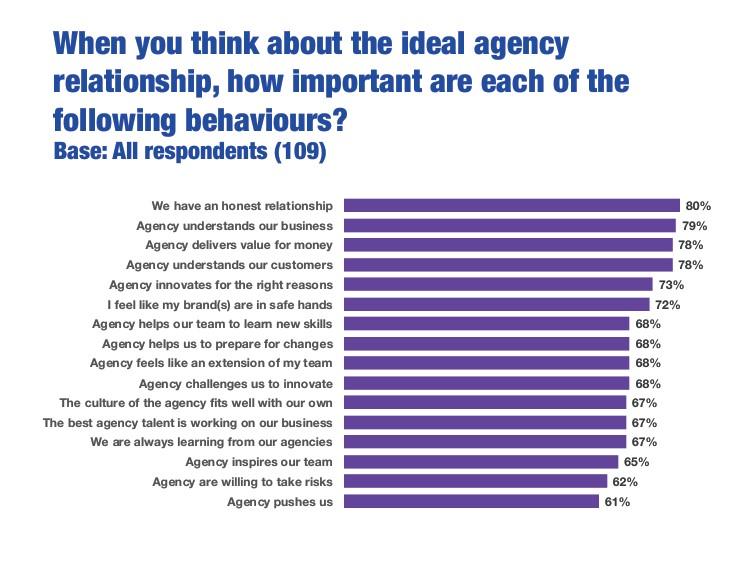
Sets Clear Expectations
Clear client communication helps to set project expectations. It’s important to be upfront about what you can deliver, how long it will take, and what the process will look like.
This is a key part of the client onboarding process.
When you outline the scope of your work and expected timelines from the start, your clients know exactly what they’re getting. They won’t be surprised by the time it takes to see results or what’s required to achieve their goals.
This clarity makes everyone’s job easier.
Clarity in client communication is key.
Use your SEO process to create a framework:
– Ask the right questions
– Understand objectives
– Establish an organised workflowGood communication = successful client relationships.
— Sam Underwood 🇬🇧 (@SamUnderwoodUK) March 26, 2023
Increases Client Retention
When clients feel understood and involved, they’re more likely to stay with your agency.
A recent survey found that 66% of people have ditched a company and moved to a competitor due to communication issues:
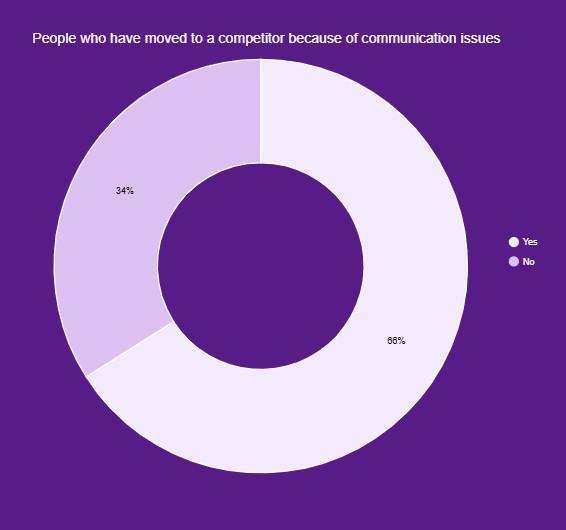
That’s right. Poor communication is one of the most common reasons agencies lose customers.
Regular check-ins and updates show your clients that you care about the progress of their projects.
This makes them feel valued.
When clients see consistent efforts and results, they feel more confident in their decision to hire you. They’re more likely to see the value you provide and continue the relationship.
Happy clients are also more likely to refer other businesses to your agency. Excellent communication can help you attract more new clients and win back lost clients.
If you’re building an agency right now
Put the most effort into service delivery and client communication
If you do good for your current clients they’ll refer their friends
Then you get leads who are already sold on you before the call
— Umar (@umzrs) September 18, 2023
Facilitates Problem-Solving
SEO can be unpredictable. Even the most well-planned strategy can encounter challenges. How you handle these issues can make a big difference in the outcome.
Strong communication can make your clients feel more comfortable bringing up any concerns they may have.
When clients know they can reach out to you and get a quick response, it can help to highlight misunderstandings before they escalate. You can resolve issues before they become bigger headaches later on.
Client communication tips:
-Deliver occasional advice outside your contract deliverable
-Respond in 24 hours or less every time, even if you say “confirming receipt, will respond by X”
-Be proactive rather than reactive. Clients want consultants, not worker bees— Ross Hudgens (@RossHudgens) April 19, 2019
Open communication helps you troubleshoot and find solutions that meet your client’s needs.
Improves Efficiency
Communication significantly impacts the efficiency of your SEO projects. It helps to avoid misunderstandings between your agency and the client.
Projects usually go much more smoothly when everyone knows what’s happening and what’s expected. Your team understands the tasks, deadlines, and responsibilities.
This means fewer mistakes and less time wasted on rework.
Important Client Communication Skills
If you want to improve client communication at your agency, you need to focus on developing the following skills.
Active Listening
Active listening is about fully understanding and responding to your clients’ needs. You need to be engaged and demonstrate that your client’s input is being received and valued.
An effective verbal communication strategy is to reflect back what the client has said. This helps to clarify their message and shows that you are paying close attention.
Clear and Concise Communication
Communicating information clearly and concisely is crucial. Whether it’s an email or a link building report, clear messaging helps avoid misunderstandings.
Use simple language, short sentences, and bullet points where possible to make your writing easy to follow.
Empathy
It’s easy to get lost in the data when it comes to digital marketing and SEO. However, empathy is at the heart of successful marketing and communication.
You need to empathize with and understand your client’s feelings. This will help you address clients’ concerns and create a more personalized agency experience.
Adaptability
Being adaptable means adjusting your verbal and written communication to meet the needs of each client.
Different clients have different communication preferences. For example, some clients will prefer a quick phone call to discuss results, while others might prefer more detailed keyword research reports, performance updates, and regular meetings.
Being flexible in your communication strategy can boost client satisfaction.
Patience
Patience is super important when it comes to managing SEO clients.
SEO involves many different aspects, some of which are very complex. For example, a small business client might struggle to understand the importance of canonical tags or schema markup.
You need to be patient. Take time to explain things and answer questions to build confidence and trust.
How to Improve Client Communication
Here are some practical client communication best practices to implement at your agency.
Regular Updates
Keep your clients in the loop. Schedule regular updates to keep them informed about what’s happening with their project.
These meetings can be weekly, bi-weekly, or monthly, depending on the client’s preference and the project. Regular check-ins are an opportunity to show the progress you’ve made and detail the next steps you’ll take to help your clients reach their goals.
You also need to be available when clients reach out to you for updates. A recent survey found that responsiveness is the second most desired agency attribute that clients look for:
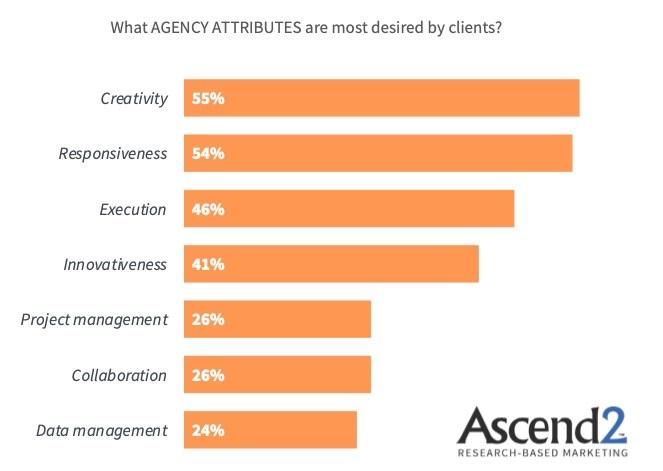
If there are any delays or issues, explain how you plan to address them. This keeps clients informed and shows that you’re proactive and on top of things.
Engaging and Actionable Reporting
SEO reports play a key role in keeping clients informed and satisfied with your services.
First, you need to establish your client’s preferred reporting methods. A recent study found that 38% of clients prefer static reports. However, live dashboards could be an option for larger enterprise clients.
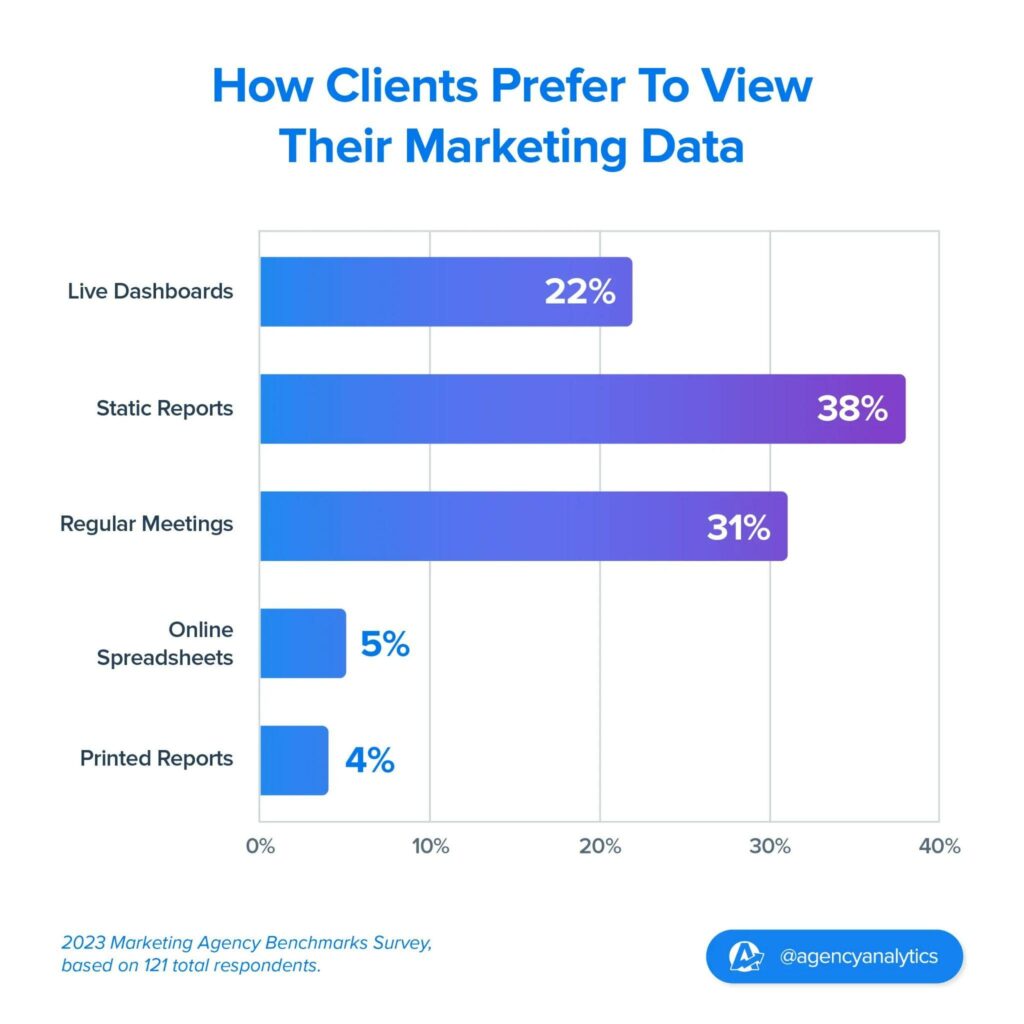
Next, you need to make sure your reports are easy to understand and relevant to your client’s needs.
Avoid any technical jargon and explain things in simple terms. You want clients to be able to understand the information even if they only have a basic understanding of SEO.
Keep your reports focused on the most important information and use visuals like charts and graphs to present data. This can make it easier for clients to see trends and understand results.
Don’t just present your clients with a bunch of screenshots from different SEO tools. Explain what the data means and how it impacts your client’s search visibility.
Your SEO reports should also be actionable. Based on your findings, include recommendations for the next steps or adjustments to the strategy.
Be Transparent
Transparent communication builds trust and ensures that your clients always know what’s going on with their projects. It’s about being open and honest when communicating with your clients.
This is especially important if you’re explaining SEO to clients who are not quite familiar with it, or are less technically savvy.
If things are going well, let your clients know and celebrate the successes.
However, if there are challenges or delays, be upfront about them. Explain what the issues are, why they happened, and what steps you’re taking to resolve them.
Don’t wait for your clients to ask about issues or express concerns. Be proactive and keep your clients informed.
If you make a change to the strategy or recommend a new approach, explain the reasoning behind it. Provide clear explanations for your decisions. This helps clients see the value of your expertise.
Use Client Communication Tools
There are plenty of tools you can use to streamline client communication.
First, consider using a customer relationship management (CRM) platform. Client communication software like HubSpot and Salesforce can help you manage clients by storing a record of all interactions in one place.
You can also use your CRM to automate tasks like sending follow-up emails and scheduling meetings.
Project management software like Asana and Trello are helpful for organizing tasks, setting deadlines, and tracking progress. These tools allow clients to see what’s being worked on and when it’s expected to be completed.
In a recent survey, 49% of respondents agreed that project management tools had enhanced team communication:
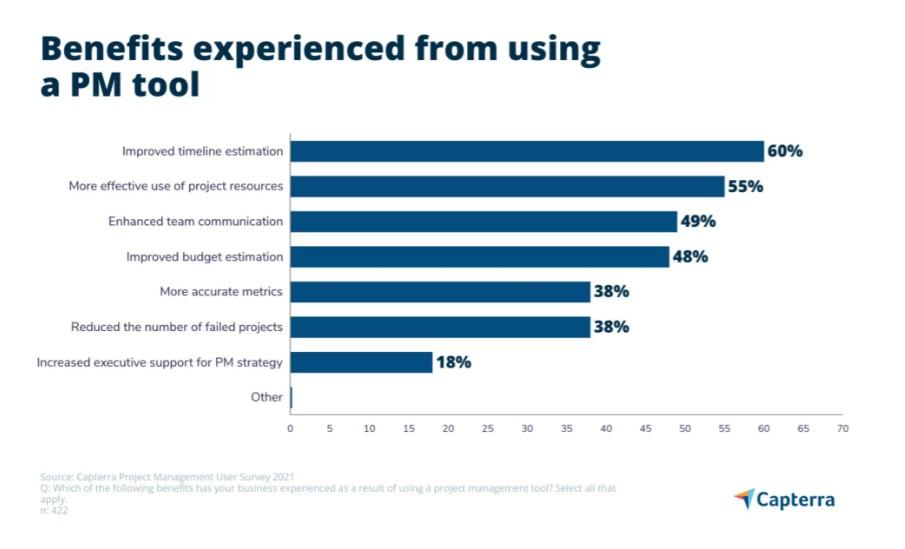
You can improve client collaboration by using a file-sharing platform like Google Docs or Dropbox.
These platforms make sharing documents, reports, and other files with clients easy. They help you keep your clients updated with the latest information and allow for real-time collaboration.
Handle Negative Feedback
Receiving negative feedback can be tough. But it’s important to stay calm and avoid getting defensive.
Your goal is to understand the issue and find a solution. Not to win an argument or justify your actions.
Start by acknowledging the feedback and thanking the client for sharing it. Even if you feel the feedback is unfair, you still want to show your client that you value their input.
Make sure you fully understand the feedback. Ask clarifying questions if something isn’t clear or you need more information to address the issue.
If the feedback highlights a mistake, take responsibility. Apologize and explain how you plan to prevent similar issues in the future.
Then, work with your client to find a solution. If it’s a simple fix, resolve the issue and show the client. For more complex problems, ask the client for their input on the best way forward.
This collaborative approach shows you are committed to fixing the problem and value their suggestions.
Don’t Make Assumptions
Have you heard of the expression “assumption is the mother of all mistakes?”
The saying certainly rings true for client communications. Assumptions can lead to misunderstandings, unmet expectations, and frustrated clients.
Instead of assuming you know what a client wants or needs, always ask questions to clarify your understanding. Even if something seems obvious, confirming the details ensures you’re on the same page.
Keep records of important client meetings and interactions. This way, you can always refer back to previous communications if there’s any confusion.
You can use tools like Otter AI and Avoma to transcribe and summarize your client calls. These tools summarize the key points so you can easily check the details of important client meetings.
Training and Development
Communication skills are essential for every client-facing team member at your agency. Your team members represent your agency with every email they send and comment they leave on a Google Doc.
That’s why you should invest in communication training.
This can include workshops, webinars, or online courses. Many learning platforms and universities offer online and in-person business communication courses.
You can create SOPs for regular customer-facing tasks like reporting and onboarding. Standard operating procedures (SOPs) are written guidelines that detail how to perform specific tasks.
Check out our guide on SOPs if you need help creating these documents for your agency.
Building Stronger Client Relationships Through Effective Communication
Effective client communication is one of the most important aspects of running an SEO agency.
Responsiveness and transparency are key.
Keep your clients informed, listen to their needs, and be transparent about your processes.
That’s how you create a solid foundation for long-term success and growth for your agency.
Become a Pro at SEO
Join 65,000 others and learn the secrets to SEO success with our weekly blog posts.
